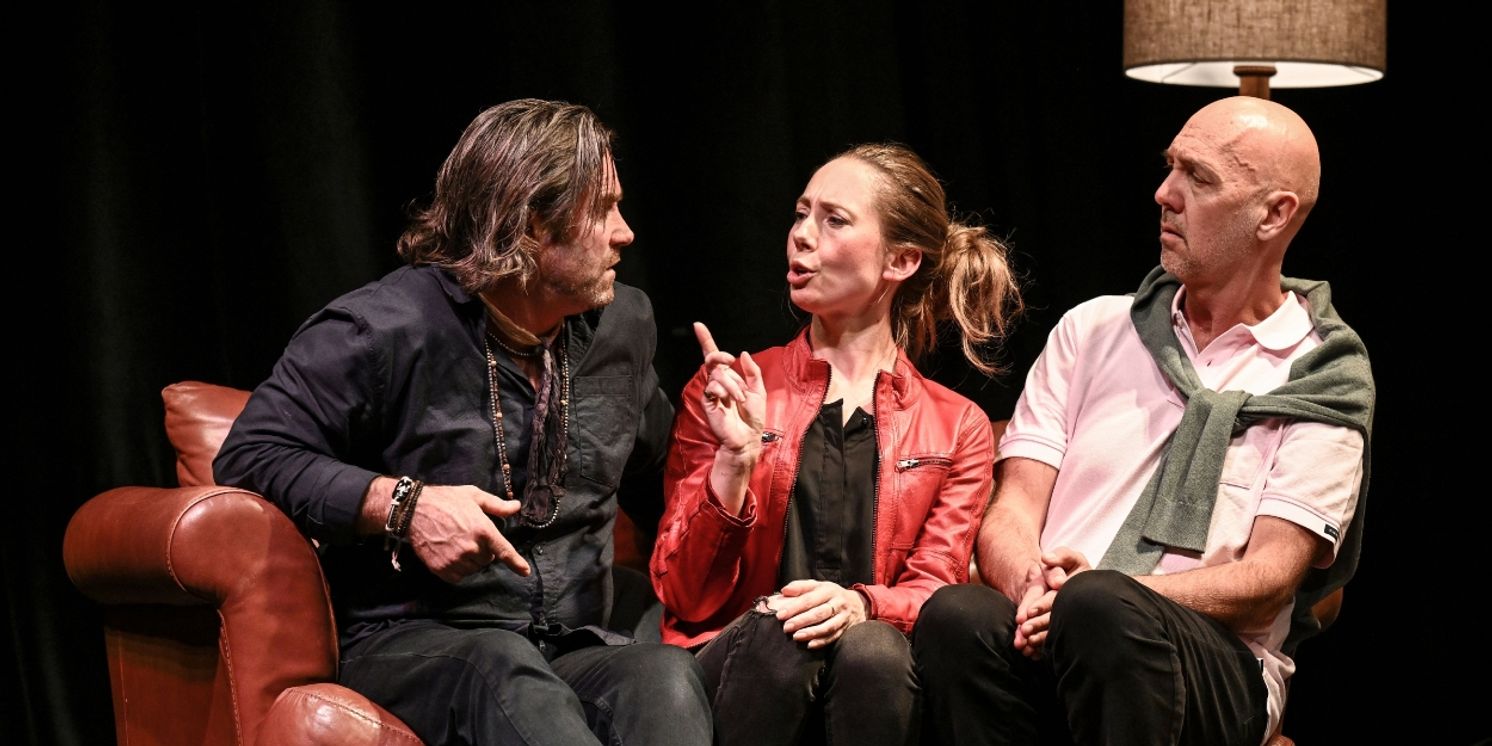Review: ULSTER AMERICAN at The Arch, Holden Street Theatres
The blackest of comedies.

Reviewed by Barry Lenny, Thursday 11th May 2023.
Joh Hartog's group, Accidental Productions, was a regular at the Bakehouse Theatre, a much-loved venue that was bought and closed down by a Pentecostal church. He has found a new home at Holden Street Theatres, where he is directing David Ireland's very black comedy/drama, Ulster American, under his new group name, JH Productions. He has crafted a superb piece of theatre for the company's debut in this venue.
The play, which some might remember from the 2019 Adelaide Festival, revolves around three people, Jay Conway, an Oscar-winning Hollywood actor, Ruth Davenport, a Northern Irish playwright, and Leigh Carver, an English director.
A brief but incomplete history of Northern Ireland might help to put this play, and the one written by Ruth that is referred to from time to time, into context. The Government of Ireland Act 1920 divided Ireland into two self-governing UK territories: the six north-eastern counties (Northern Ireland) being ruled from Belfast, and the other twenty-six counties (Southern Ireland, which became the Irish Free State in 1922) being ruled from Dublin. Those six counties, Antrim, Armagh, Down, Fermanagh, Londonderry (known in the Republic simply as Derry), and Tyrone, are part of the province of Ulster, the other three counties in Ulster, Cavan, Donegal, and Monaghan, are part of the Republic of Ireland. The residents of Northern Ireland are either Protestant Unionists or Catholic Nationalists, the two groups remaining segregated by mutual agreement. In the late 1960s, violence, known as 'the troubles', began and continued for three decades, until the 1998 Good Friday Agreement.
Ruth's play revolves around Tom, a man released from prison under that Good Friday Agreement, the role that Jay Conway has been contracted to play. Tom is a violent Unionist, who takes his revenge on Catholics. Ruth is a Unionist, and declares that she is British, not Irish. Both of these facts give rise to conflict, as you will discover when you see this play. Jay claims to be an Irish/American Catholic, but has never been to Ireland, has little or no understanding of its history or politics, and probably doesn't even attend church. Leigh is English, also with no understanding of Ireland. Both men are misogynistic, sexist, have a false sense of male superiority, and worse. Ruth, though, is not particularly likeable, either.
It begins with Jay and Leigh, in Leigh's lounge room, waiting for Ruth to arrive. Jay is quickly exposed as, not only a misogynist, but also ignorant and a bully. We laugh at his dialogue, but should we? There are lots of one-liners, and cultural confusion as each refers to people unknown to the other, with mention only of the surname, Baldwin, each thinking of a different person. The conversation takes a darker turn, led by Jay, pressuring Leigh into engaging with his mind games, until Ruth arrives. The comedy gradually gives way to intense drama.
Brendan Cooney plays Jay, creating a thoroughly obnoxious individual with an overactive ego, solely based on winning an award given by a majority of the 6,000 Academy voters, almost all of whom are Caucasian, three-quarters of them male, and half over 60. One sometimes questions the significance and real value of these and other industry awards, but that's another story. Cooney gets laughs from Ray's repeated suggestion that he wears an eye patch for the role, and his ludicrous suggestion that an Irish dance sequence be added.
Leigh is played by Scott Nell, giving us a weak man who sees himself as socially superior, swaying back and forth as he acquiesces to Jay's demands, and sidelines Ruth, devaluing her work and her gender, as well as her cultural identity. He cares nothing about either of them, only his own career and reputation. Nell's interpretation of Leigh is as oily as a dodgy 1960s used car salesman.
In the first part of the play, these two engage in powerful interplay, the upper hand shifting to and fro, but mostly dominated by the bullying of Jay. The dynamic shifts when Ruth appears.
Cheryl Douglas is Ruth, presenting an enthusiastic playwright, initially awed by the presence of Jay and delighted at his acceptance of the lead role in her play and the possibility that he might introduce her to Tarantino. Her respect for him quickly fades as she learns more about the man, along with the working relationship with her director, Leigh. Douglas clearly shows Ruth's disdain for Jay, and her loss of respect for Leigh.
Each of the three delivers a convincing performance and each is amplified by the performances of the others in strong ensemble work.
There is a touch of unintended humour when Ruth attacks Jay for his awful attempt at a Belfast accent. It is one of the hardest regional accents for an actor to portray convincingly, as we see here. Adelaide can boast Irish immigrants from all over, both the Republic and Northern Ireland, which is worth noting for future reference as somebody could easily be found to record the dialogue for an actor to copy.
The design, by Tammy Boden, works effectively, and is well-lit by Stephen Dean. Special effects makeup is by Gabi Douglas.
A standing ovation, and a demand for a second curtain call, left me wondering why such an excellent production was not completely sold out on the opening night. Don't wait for word to spread, book quickly or you might miss out. Book here.
Reader Reviews
Videos

